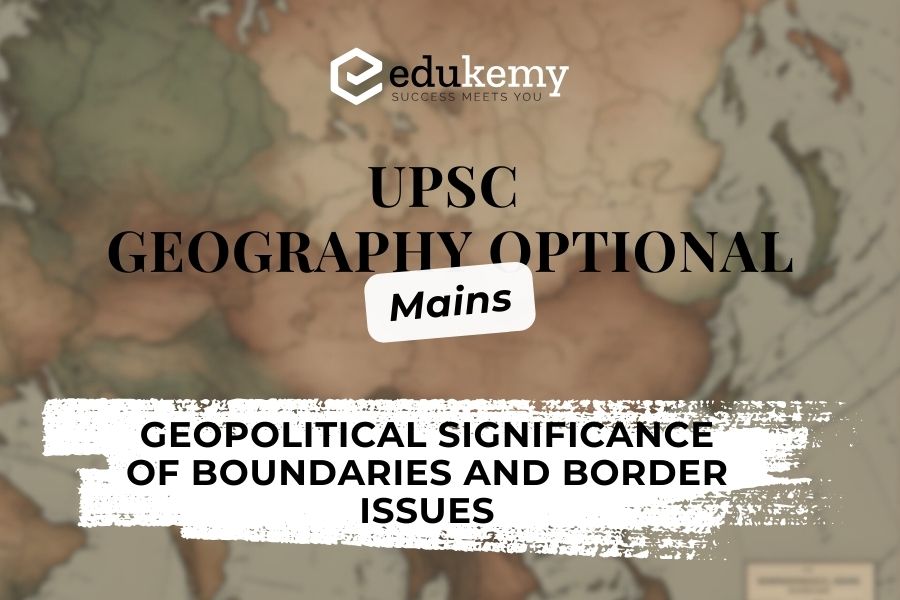
Explore the significance of boundaries in geopolitics and their impact on international relations, as per the UPSC Geography Optional Mains exam for 2021. Delve into the role of boundaries in demarcating territories, asserting sovereignty, and delineating geopolitical interests. Examine the complexities arising from both inclusive and exclusive aspects of borders, including issues of identity, migration, and resource distribution. Analyze the challenges posed by inclusionary borders in managing diversity and fostering unity, as well as the tensions stemming from exclusionary borders in exacerbating conflict and inequality. Gain insights into the geopolitical implications of boundary dynamics, essential for understanding global politics and navigating contemporary geopolitical challenges. This examination offers a nuanced perspective on the multifaceted role of boundaries in shaping geopolitical landscapes.
Contents
Answer:
Introduction:
Boundaries in geopolitics serve as physical or conceptual lines that define the extent of a territory. They play a crucial role in shaping political, economic, and social interactions between nations.
Body:
Issues from Inclusionary Aspects of Borders:
- Cultural Diversity and Identity: Inclusionary borders may lead to the blending of diverse cultures, fostering a sense of unity but potentially eroding distinct identities.
- Example: The European Union’s open borders encourage cultural exchange but have also raised concerns about the preservation of individual national identities.
- Economic Integration: Inclusive borders can facilitate economic cooperation, but may also raise concerns about resource distribution and economic imbalances among neighboring nations.
- NAFTA (North American Free Trade Agreement) exemplifies inclusive borders promoting
economic collaboration while also generating debates about job displacement and trade
imbalances.
- NAFTA (North American Free Trade Agreement) exemplifies inclusive borders promoting
- Security Challenges:Collaborative security measures within inclusive borders may arise, but the risk of security threats spilling over from one country to another could increase.
- The Schengen Area’s inclusive border policy enhances internal security but has faced
challenges in managing the spillover of security threats.
- The Schengen Area’s inclusive border policy enhances internal security but has faced
- Migration Pressures:Inclusionary borders might attract migration, leading to population movements that could strain resources and challenge social cohesion.
- The inclusivity of Scandinavian borders has attracted migration, posing both
opportunities and challenges for social integration and resource distribution.
- The inclusivity of Scandinavian borders has attracted migration, posing both
- Political Harmony or Disputes:While inclusive borders may promote political stability, they could also spark territorial disputes and power struggles among nations.
- The Mekong River Commission fosters collaborative efforts among Southeast Asian
nations, yet conflicting interests hinder effective environmental management.
- The Mekong River Commission fosters collaborative efforts among Southeast Asian
Issues from Exclusionary Aspects of Borders:
- Ethnic Tensions:Exclusionary borders may exacerbate ethnic tensions by separating communities, potentially leading to conflict and displacement.
- The partition of India in 1947 created exclusive borders, contributing to enduring ethnic
tensions between India and Pakistan.
- The partition of India in 1947 created exclusive borders, contributing to enduring ethnic
- Trade Barriers:Exclusive borders can hinder trade, imposing economic barriers that may result in strained international relations and economic decline.
- Brexit introduced trade barriers between the UK and the EU, impacting economic
relations and prompting concerns about the stability of the European market.
- Brexit introduced trade barriers between the UK and the EU, impacting economic
- Isolationism and Nationalism: Exclusionary borders may fuel isolationist tendencies and
nationalist sentiments, limiting global cooperation and diplomacy.- North Korea’s exclusive policies result in isolationism, fostering a strong nationalist
sentiment but limiting international cooperation.
- North Korea’s exclusive policies result in isolationism, fostering a strong nationalist
- Humanitarian Concerns: Exclusionary policies might impede the delivery of humanitarian aid,
exacerbating crises in border regions.- The Rohingya crisis highlights the challenges of delivering humanitarian aid across
exclusive borders, exacerbating a dire situation.
- The Rohingya crisis highlights the challenges of delivering humanitarian aid across
- Cross-Border Crime: Exclusionary borders may create havens for criminal activities, as law enforcement struggles with jurisdictional challenges.
- The U.S.-Mexico border struggles with cross-border crime, emphasizing the difficulties in law enforcement collaboration due to jurisdictional issues.
- Disparities in Development: Exclusive borders can contribute to economic disparities, fostering uneven development and perpetuating inequalities.
- Exclusive borders in Africa have contributed to economic disparities, with certain regions facing slower development compared to others.
Conclusion:
Emphasizing diplomacy, international cooperation, and addressing the root causes of conflicts can pave the way for a more interconnected and harmonious global society. Recognizing the intricate relationship between borders and geopolitics is essential for fostering sustainable peace and development.
In case you still have your doubts, contact us on 9811333901.
For UPSC Prelims Resources, Click here
For Daily Updates and Study Material:
Join our Telegram Channel – Edukemy for IAS
- 1. Learn through Videos – here
- 2. Be Exam Ready by Practicing Daily MCQs – here
- 3. Daily Newsletter – Get all your Current Affairs Covered – here
- 4. Mains Answer Writing Practice – here

